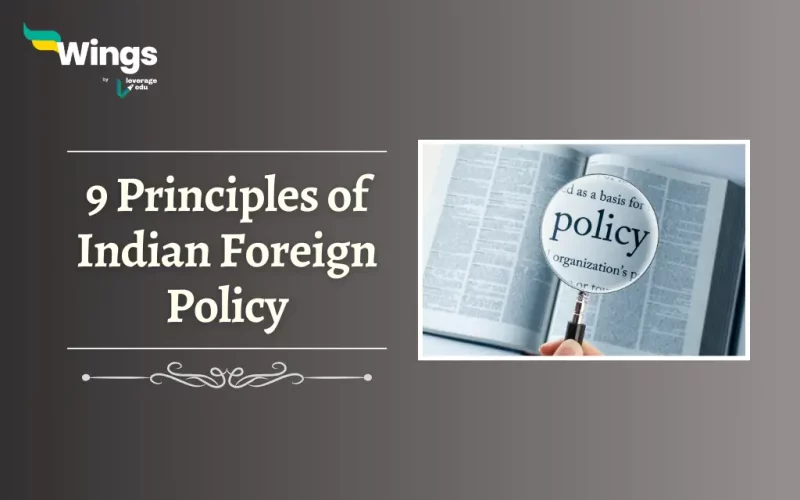India’s foreign policy is shaped by historical, geographical, and socio-political factors and rests on a foundation of key Principles. Non-Alignment is a cornerstone that maintains independence from power blocs while encouraging strategic freedom. Additionally, Panchsheel is derived from ancient Indian philosophy and advocates for peaceful coexistence. Moreover, Sovereignty and territorial integrity make sure that there is a strong defence of national interests. Furthermore, India’s commitment to global peace and cooperation is witnessed through its role in international forums like the UN. Read on to learn more in detail about the 9 Principles of Indian Foreign Policy.
Table of Contents
1. Anti-Colonialism
India’s Foreign Policy opposes colonialism and imperialism and views them as exploitative tools that harm weaker nations and disrupt global peace.
- India supports liberation movements in Afro-Asian countries like Indonesia, Malaya, Tunisia, Algeria, Ghana, Namibia, and more.
- Moreover, India stands with them against colonial powers such as Britain, France, Holland, and Portugal.
- Furthermore, India is against modern forms of neo-colonialism and neo-imperialism.
Also Read: Difference between Colonialism and Imperialism
2. Promotion of World Peace
This Principle of Indian Foreign Policy focuses on promoting global peace and security as outlined in Article 51 of the Indian Constitution.
- Moreover, this directive highlights the promotion of just relations between nations, respect for international law, and the settlement of disputes through arbitration.
- Additionally, peace is necessary for the economic progress of countries.
3. Anti-Racialism
India opposes racialism in all its forms and views it as similar to colonialism and imperialism, hence leading to exploitation and social inequality.
- India strongly condemned South Africa’s apartheid regime therefore cutting diplomatic ties in 1954.
- Additionally, India had an important part in the liberation of Zimbabwe (formerly Rhodesia) and Namibia from white domination.
4. Non-Alignment
After India’s independence in 1947, the world was divided into two ideological blocs: the capitalist bloc led by the USA and the communist bloc led by the former USSR.
- In this context of the Cold War, India chose not to join either bloc and adopted a policy of Non-Alignment, as stated by Jawaharlal Nehru.
- Furthermore, this policy includes no military alliances with countries from either the bloc or any nation, an independent approach to foreign policy, and an attempt to maintain friendly relations with all countries.
5. Panchsheel
Panchsheel or the five Principles of international conduct were introduced in the Indo-China Treaty on Tibet’s Preamble in 1954 by Jawaharlal Nehru and Chou-En-Lai.
- The Principles include mutual respect for territorial integrity and sovereignty, non-aggression, non-interference in internal affairs, equality and mutual benefit, and peaceful coexistence.
- Moreover, Panchsheel gained popularity and was adopted by different countries including Burma and Yugoslavia.
- Along with Non-Alignment, it is one of India’s most significant contributions to international relations theory and practice.
6. Links with Commonwealth
In 1949, India declared its continued membership in the Commonwealth of Nations and acknowledged the British Crown as the association’s head, which did not affect India’s sovereignty.
- The Commonwealth is a voluntary group of independent nations, and India’s membership does not involve paying allegiance to the British Crown or granting it any functions.
- In addition, India’s membership is based on practical reasons, as it believes it benefits the country in diverse spheres.
- India has actively participated in the CHOGM and hosted the event in New Delhi in 1983.
7. Support to the UNO
India joined the UN in 1945 and has consistently supported its activities and programs, hence demonstrating full faith in its objectives and principles. India’s involvement in the UN includes:
- Advocating against colonialism, imperialism, racism, and modern challenges like neo-colonialism, neo-imperialism, and terrorism.
- Vijay Lakshmi Pandit of India served as the President of the UN General Assembly in 1953.
- Actively participating in UN Peacekeeping missions in various countries like Korea, Congo, El Salvador, Cambodia, Angola, Somalia, Mozambique, Sierra Leone, and Yugoslavia, among others.
- Moreover, engaging in open-ended working groups within the UN, with India co-chairing the group on strengthening the UN that presented its report in 1997.
- Holding non-permanent seats on the UN Security Council multiple times and currently advocating for a permanent seat on the Security Council.
8. Disarmament
India’s foreign policy opposes arms races and advocates for disarmament, both conventional and nuclear, to promote world peace, reduce tensions, and encourage economic development.
- India has utilized the United Nations to combat the arms race and promote disarmament.
- In 1985, India hosted a six-nation summit in New Delhi and proposed nuclear disarmament measures.
- Although India has signed the Nuclear Non-proliferation Treaty (NPT) of 1968 and the Comprehensive Nuclear-Test-Ban Treaty (CTBT) of 1996, it opposes these treaties due to their discriminatory and hegemonic nature, which permits only 5 nations (USA, Russia, China, UK, and France) to possess nuclear weapons.
9. Afro-Asian Bias
Furthermore, India’s foreign policy focuses on friendly relations with all nations but shows a special interest in Afro-Asian countries.
- It aims to unite them, giving them a voice in global affairs. India has sought international aid for their economic development.
- Moreover, it initiated the first Asian Relations Conference in 1947 and convened Asian countries on Indonesian freedom in 1949.
- India actively participated in the Bandung Conference in 1955 and contributed to the formation of the Group of 77 (1964), Group of 15 (1990), Indian Ocean Rim Association (1997), BIMSTEC (1997), and SAARC (1985).
- This approach has earned India the nickname ‘Big Brother’ from neighbouring countries.
Related Blogs
Lastly, we hope you liked our blog and gained an understanding of the 9 Principles of Indian Foreign Policy. Moreover, you may even read more blogs and empower yourself with knowledge regarding Civics and Polity!
 One app for all your study abroad needs
One app for all your study abroad needs













